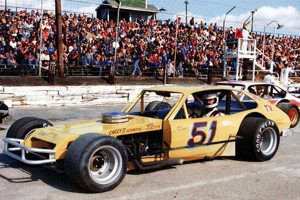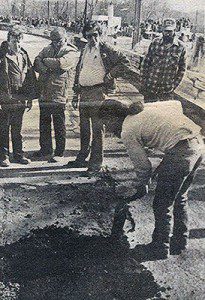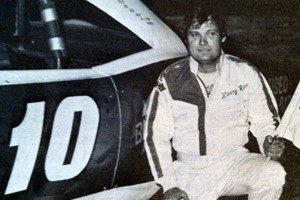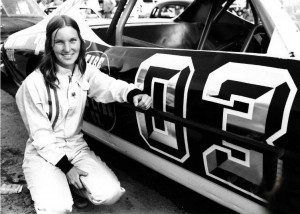
(Steve Kennedy photo)
The supporting divisions were revamped prior to the 1980 season. The Grand American division, the struggling Late Model division whose cost to be competitive had risen over the last few seasons, was finally dissolved after the 1979 season when their car counts dipped below 15 on several occasions. The Street Stock division, which began in 1977 as a low-budget alternative, had flourished during that same time into highly competitive division. Beginning in 1980, the latter division was revamped into the Super Stocks and was now the Speedbowl’s Late Model division.

delayed to fix potholes in the
racing surface (New London
Day photo)
The season started with controversy during the Blast Off 100 event on March 31st. A snow storm hit the area Friday night into Saturday morning. Track crews worked non-stop from Saturday afternoon until Sunday to dry the track, but by practice time on Sunday some race teams – including Art Barry and his #21 team – chose not to compete due to the conditions. Water seeped up through the ground onto the track, making the inside groove extremely slippery. There were also times when action was stopped to repair holes in the asphalt in turns 1 and 4. Despite the DMV’s presence, and Harvey Tattersall Jr’s proposal to postpone the event at the drivers meeting should race teams feel as a whole that the conditions were unsafe, the event went off as scheduled albeit with the periodic delays. Claremont (NH) Speedway regular Marty Radewick won the 100 lap event from the pole. The Speedbowl would then take the month of April off before resuming with it’s weekly Saturday night program on May 3rd.

revamped Super Stock division in 1980 (Steve
Kennedy photo)
Bob Potter won his 2nd Modified Championship at the Speedbowl over Moose Hewitt and Rick Donnelly. It was the second straight year they were the top 3 point finishers. Potter won a division-best 7 races including 100 lappers in July & August as well as his second straight Waterford 200 victory. Donnelly won the Memorial Day 100, which was postponed to June due to rain.
In the Super Stocks, Harry Rice beat out former Grand American driver Brian McCarthy for the points championship. Rice won 4 times – including 3 out of the first 5 to start the season. He capped the season with a non-point 50 lap win during the Race of Champions weekend which the Modifieds had off. Mike Lovetere won the longest race of the year – the Firecracker 100 held on Wednesday July 30th.
On May 3rd, Rae Ann Williams became the first female to qualify for a feature event in Speedbowl history. It was the second race of the season. Rae didn’t fair too well in the main event, she finished a disappointing 22nd.

qualify for a Speedbowl feature event on May 3,
1980 (Steve Kennedy photo)
On July 26th when the annual Waterford 200 event was scheduled, competitors in both divisions went on strike in protest to a new tire rule the track was trying to implement. The current Firestone 46 tires were to be replaced by a more expensive McCreary tire. Many race teams believed the Y3 compound in the 13.5″ McCreary tire would last for one race week only. McCreary tires were $35 more per tire than the Firestone brand. Over the next few days, Speedbowl officials decided to allow both tires during competition and racing resumed on Wednesday with the Super Stock 100 event. After a rainout the following Saturday, weekly point racing resumed on August 9th. The 200 lap event was pushed back to Labor Day weekend. Only 3 Modified race teams chose to use the more expensive McCreary tires: Moose Hewitt, Don Bunnell and Larry Lanphear.
The NEMA midgets again made a visit to the shoreline oval. This season’s 25 lap event was won by Butch Walsh in early May. The New England Mini Modifieds (now Pro-4 Modifieds) returned during the Super Stock 100 event in July. The 25 lap feature was won by Ron St. Ives.
Rain cancelled 5 of the 7 events scheduled from Memorial Day weekend until the 4th of July.
1980 was the 33rd and final season of the United Stock Car Racing Club. Formed in 1948, it was the premiere sanctioning body for auto racing in the northeast throughout the 1950’s and 1960’s. Waterford had been the lone United track left since 1976. Tattersall’s Summer Corporation dissolved after the 1980 season, with John Janisaitis moving to the Seekonk Speedway. Harvey Tattersall Jr would own the Speedbowl for another 8 seasons, but leased the racing operation out to several promoters during those years.
SPEEDBOWL DOC SERIES
Segment on Rae Ann Williams, the first women to qualify for a Speedbowl feature – from Vault Productions’ documentary series on Speedbowl history.
